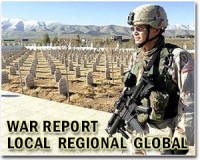| . |  |
. |
Beirut, Lebanon (UPI) May 13, 2010 Antonio Cassese, head of a problem-plagued tribunal investigating the 2005 assassination of former Prime Minister Rafik Hariri, has assured Lebanon it will uncover those responsible despite allegations of political interference. The work of the Special Tribunal for Lebanon, in The Hague, "is purely judicial, given the fair participating judges who will not be influenced by political ideologies," he declared. "The STL will get the job done and reveal the truth despite the crime's complexity." The tribunal's acting registrar, Herman von Hebel of Germany, said in April that the tribunal was ready to issue indictments issued by chief prosecutor Daniel Bellamare of Canada, who headed the probe in 2008-09. But five years after Hariri was assassinated in a massive Valentine's Day bombing on Beirut's Corniche, the ground-breaking U.N. investigation to bring his killers to justice -- the first international probe of an act of terrorism -- seems to be running out steam. And, it seems to many Lebanese, this is all in the cause of geopolitical expediency. The Americans and their allies, who initially championed the investigation and the tribunal, have backed off in recent months as U.S. President Barack Obama has sought to engage Damascus after a 5-year hiatus in hopes of isolating Iran, Syria's strategic ally. President George W. Bush's administration fervently advocated hunting down Hariri's killers because the prime suspects were -- and for many Lebanese, remain -- the Syrian leadership and their surrogates in Lebanon's intelligence establishment. Then, Syria was part of Bush's infamous "axis of evil," Iran's lone Arab ally, and a "facilitator" of the Iraq insurgency. Bush turned up the heat on President Bashar Assad, who has repeatedly denied his regime had any involvement in Hariri's death. He's also sworn never to hand over any Syrian official to the tribunal. But Obama has sought to lure Assad from his alliance with Tehran. His efforts, it turns out, may have come to naught but it may have got Damascus off the hook. It's generally believed Hariri was assassinated because he had turned against Damascus and its interference in Lebanese politics and championed a campaign to force out the Syrians who had effectively ruled Lebanon for nearly 30 years. The problem is that if Syria is accused, Lebanon will face a new explosion of violence and possibly renewed civil war. "Since Hariri's murder, much time has passed and the situation has changed," says Patrick Vibert of the Royal Institute of International Affairs in London. "Lebanon is still deeply pained by the loss of Hariri but the trouble that could come as a result of a suspect being named, especially if it's a Syrian, could vastly outweigh the good it would do to know who was responsible." It's also difficult to see who the tribunal will indict. Four pro-Syrian generals who headed Lebanon's security services at the time Hariri was killed who were locked up in August 2005 by the first head of the investigation, German prosecutor Detlev Mehlis, were freed in April 2009 on grounds of lack of evidence. Mehlis, who quit in December 2005, still maintains the generals played a key role in the assassination, acting under orders from Damascus. In October 2005 Mehlis named several top officials close to Assad as suspects. To Hariri's Sunni followers and the large number of young Lebanese of all sects galvanized by the assassination to agitate for political reforms, all this smacks of betrayal by the Americans, who found it expedient to cozy up to Damascus. In 1990, Bush's father allowed Syria free rein in Lebanon as a reward for joining the U.S.-led coalition against Saddam Hussein, a long-time enemy of Assad's late father Hafez. Now many Lebanese see Obama, for all his talk of principled politics, selling them out again. Michael Young, a Lebanese political commentator and prominent critic of Syria and its Lebanese allies, blasted those who succeeded the doughty Mehlis -- Belgian judge Serge Brammertz and Canada's Bellemare -- in a New York Times op-ed in February. Young alleged that they stymied the U.N. investigation through an over-emphasis on technical analysis and a lack of transparency that "discouraged potential witnesses from coming forward." There is a widespread suspicion that they were ordered by U.N. headquarters to back off Mehlis' zealous pursuit of the Syrians because the political fallout would be too dangerous.
Share This Article With Planet Earth
Related Links
 Comoros army calls for 'frank dialogue' to keep peace
Comoros army calls for 'frank dialogue' to keep peaceMoroni (AFP) May 11, 2010 The army in the Comoro Islands on Tuesday urged political parties to hold a "frank and constructive dialogue" to keep the peace when President Ahmed Abdallah Sambi's mandate expires on May 26. Sambi had been due to step down then, but instead the parliament has decided to hold both presidential elections and elections for the governors of the three islands - Grande Comore, Anjouan and Mohel ... read more |
|
| The content herein, unless otherwise known to be public domain, are Copyright 1995-2010 - SpaceDaily. AFP and UPI Wire Stories are copyright Agence France-Presse and United Press International. ESA Portal Reports are copyright European Space Agency. All NASA sourced material is public domain. Additional copyrights may apply in whole or part to other bona fide parties. Advertising does not imply endorsement,agreement or approval of any opinions, statements or information provided by SpaceDaily on any Web page published or hosted by SpaceDaily. Privacy Statement |